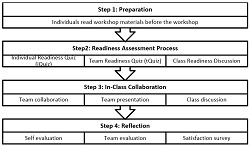A team is a group, but a group is not a team
Although many people use the words "team" and "group" interchangeably, a team differs from a group in many ways. Understanding the difference between teams and groups can help influence how we build and work with a learning team.
Behavioral scientists generally define a group as two or more people interacting with and influencing one another (Hughes, Ginnett, & Curphy, 2005; Jex, 2002; Kreitner & Kinicki, 2008). Social psychologists see humans as social beings (Fiske, 2010) or social animals (Aronson, 2008) who join groups to satisfy shared survival needs (Kenrick, Neuberg, & Cialdini, 2007) relatedness (Calvin, 1996), and growth (Maslow, 1987). From a managerial perspective, Jon Katzenbach and Douglas Smith (1993) described the difference between groups and teams by performance, saying, "A group's performance is a function of what its members do as individuals. A team's performance includes both individual results and… collective work-products" (p. 111). From a team-based learning perspective, L. Dee Fink (2004) defined a team as the "intense use of small groups." A team's members share goals, commitment, and skills to complete complex tasks. Together, team members perform beyond the capacity of individuals working alone.
Understanding the differences between a baseball team and baseball fans can help to clarify the differences between groups and teams.
Baseball fans are members of a group of people who gather to cheer for the team. Baseball fans are people from different lifestyles who share an interest in the team and may influence each other as they cheer for the team in the baseball stadium. However, the fans are not the team.
In comparison, a baseball team is a group of interdependent members with complementary skills who work together to accomplish individual and group goals. The team's coach works to define the goals, develop the skills of individuals, and coordinate individual activities to win games.
This analogy highlights a significant difference between teams and groups. A group is a collective in which individuals have less importance. In comparison, a team is a group that succeeds by developing the ability and coordinating the skills of individuals to accomplish shared goals. In other words, a successful team focuses on individual and team development.
In short, a team is a group of individuals, but a group of individuals is not necessarily a team. Members of a group may share common interests and influence one another. Members of a team also share common interests and influence. In addition, team members share commitments and goals and have clearly defined roles and responsibilities, complementary skills, mutual accountability, and a shared identity. By working together to develop and coordinate the skills and activities of individuals, a team has the potential to accomplish more together than they can as individuals.




